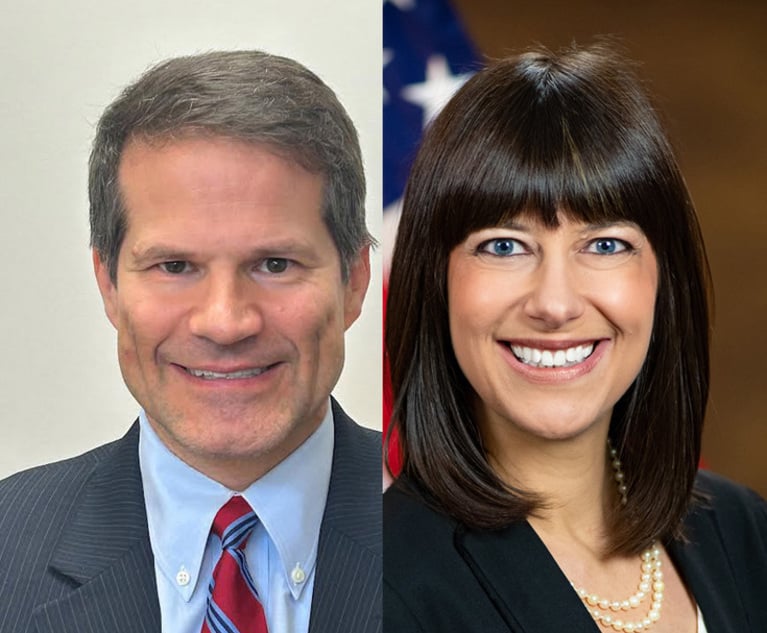 Reality Winner, charged with leaking U.S. secrets to a news outlet, walks into the Federal Courthouse in Augusta, Georgia, June 26, 2018. (Michael Holahan/The Augusta Chronicle via AP)
Reality Winner, charged with leaking U.S. secrets to a news outlet, walks into the Federal Courthouse in Augusta, Georgia, June 26, 2018. (Michael Holahan/The Augusta Chronicle via AP)Reality Winner Faces 'Longest Sentence' for Leaking to Media
In a court filing Tuesday, federal prosecutors said the 63-month sentence they're recommending is plenty stiff; Winner's defense lawyers said in their court filing Wednesday that similar prosecutions resulted in less severe penalties.
August 16, 2018 at 02:25 PM
3 minute read
A Georgia woman who mailed a secret U.S. report to a news organization faces the “longest sentence” ever behind bars for a federal crime involving leaks to the news media, prosecutors said in a court filing.
Former National Security Agency contractor Reality Winner, 26, is scheduled to be sentenced Aug. 23 by U.S. District Court Judge J. Randal Hall in Augusta. She pleaded guilty in June to a single count of transmitting national security information when she worked in Augusta as a translator at an NSA facility.
Winner's plea deal with prosecutors calls for imprisonment of five years and three months. But the sentencing judge isn't bound by that agreement. Winner's crime carries a maximum penalty of 10 years.
The Trump administration has made prosecuting government employees who leak sensitive information to the media a high priority, and Attorney General Jeff Sessions pledged to clamp down on leaks last year.
In a court filing Tuesday, federal prosecutors in Winner's case said the 63-month sentence they're recommending is plenty stiff to deter other government workers from leaking sensitive information, even if it could be tougher.
“The government advises the Court that despite the agreed-upon sentence being below the applicable guidelines range, it would be the longest sentence served by a federal defendant for an unauthorized disclosure to the media,” the prosecutors wrote.
They cited several prior cases. Former FBI explosives expert Donald Sachtleben was sentenced in 2013 to three years and seven months in prison for leaking secret information, including intelligence he gave to The Associated Press for a story about a U.S. operation in Yemen in 2012.
Former CIA officer Jeffrey Sterling in 2015 received 3 ½ years in prison for leaking details of a secret mission to thwart Iran's nuclear ambitions. CIA veteran John Kiriakou received 2 ½ years in prison in 2013 for leaking a covert officer's identity to a reporter.
Winner's defense lawyers noted in their own court filing Wednesday that prior leak prosecutions resulted in less severe penalties than what she has agreed to, “including cases where the factual conduct, and information leaked, was arguably worse.”
Prosecutors noted their plea deal with Winner allowed the U.S. government to avoid disclosing secret information in a public courtroom. If Winner stood trial, they said, prosecutors would have been forced to reveal the classified report she leaked and have witnesses explain its contents.
“The Intelligence Community assessed that this further disclosure of the Intelligence Report and explaining its contents would compound the exceptionally grave harm to national security already caused by the defendant,” the prosecutors' court filing said.
Authorities have never described the report Winner leaked or identified the news organization that received it.
The Justice Department announced Winner's June 2017 arrest the same day The Intercept published an article on a classified NSA report suggesting Russian hackers attacked a U.S. voting software supplier before the 2016 election. The NSA report was dated May 5, the same as the document Winner had leaked.
This content has been archived. It is available through our partners, LexisNexis® and Bloomberg Law.
To view this content, please continue to their sites.
Not a Lexis Subscriber?
Subscribe Now
Not a Bloomberg Law Subscriber?
Subscribe Now
NOT FOR REPRINT
© 2024 ALM Global, LLC, All Rights Reserved. Request academic re-use from www.copyright.com. All other uses, submit a request to [email protected]. For more information visit Asset & Logo Licensing.
You Might Like
View All
Trump's Solicitor General Expected to 'Flip' Prelogar's Positions at Supreme Court


Fowler White Burnett Opens Jacksonville Office Focused on Transportation Practice
3 minute read
On The Move: Polsinelli Adds Health Care Litigator in Nashville, Ex-SEC Enforcer Joins BCLP in Atlanta
6 minute readTrending Stories
- 1Lawyer as Whistleblower? Associate Sues Firm
- 2New Class Action Points to Fears Over Privacy, Abortions and Fertility
- 3Ex-Big Law Attorney Disbarred for Defrauding $1 Million of Client Money
- 4'New Circumstances': Winston & Strawn Seek Expedited Relief in NASCAR Antitrust Lawsuit
- 5Productivity Suite Startup Macro Announces $12 Million Funding Round
Who Got The Work
Michael G. Bongiorno, Andrew Scott Dulberg and Elizabeth E. Driscoll from Wilmer Cutler Pickering Hale and Dorr have stepped in to represent Symbotic Inc., an A.I.-enabled technology platform that focuses on increasing supply chain efficiency, and other defendants in a pending shareholder derivative lawsuit. The case, filed Oct. 2 in Massachusetts District Court by the Brown Law Firm on behalf of Stephen Austen, accuses certain officers and directors of misleading investors in regard to Symbotic's potential for margin growth by failing to disclose that the company was not equipped to timely deploy its systems or manage expenses through project delays. The case, assigned to U.S. District Judge Nathaniel M. Gorton, is 1:24-cv-12522, Austen v. Cohen et al.
Who Got The Work
Edmund Polubinski and Marie Killmond of Davis Polk & Wardwell have entered appearances for data platform software development company MongoDB and other defendants in a pending shareholder derivative lawsuit. The action, filed Oct. 7 in New York Southern District Court by the Brown Law Firm, accuses the company's directors and/or officers of falsely expressing confidence in the company’s restructuring of its sales incentive plan and downplaying the severity of decreases in its upfront commitments. The case is 1:24-cv-07594, Roy v. Ittycheria et al.
Who Got The Work
Amy O. Bruchs and Kurt F. Ellison of Michael Best & Friedrich have entered appearances for Epic Systems Corp. in a pending employment discrimination lawsuit. The suit was filed Sept. 7 in Wisconsin Western District Court by Levine Eisberner LLC and Siri & Glimstad on behalf of a project manager who claims that he was wrongfully terminated after applying for a religious exemption to the defendant's COVID-19 vaccine mandate. The case, assigned to U.S. Magistrate Judge Anita Marie Boor, is 3:24-cv-00630, Secker, Nathan v. Epic Systems Corporation.
Who Got The Work
David X. Sullivan, Thomas J. Finn and Gregory A. Hall from McCarter & English have entered appearances for Sunrun Installation Services in a pending civil rights lawsuit. The complaint was filed Sept. 4 in Connecticut District Court by attorney Robert M. Berke on behalf of former employee George Edward Steins, who was arrested and charged with employing an unregistered home improvement salesperson. The complaint alleges that had Sunrun informed the Connecticut Department of Consumer Protection that the plaintiff's employment had ended in 2017 and that he no longer held Sunrun's home improvement contractor license, he would not have been hit with charges, which were dismissed in May 2024. The case, assigned to U.S. District Judge Jeffrey A. Meyer, is 3:24-cv-01423, Steins v. Sunrun, Inc. et al.
Who Got The Work
Greenberg Traurig shareholder Joshua L. Raskin has entered an appearance for boohoo.com UK Ltd. in a pending patent infringement lawsuit. The suit, filed Sept. 3 in Texas Eastern District Court by Rozier Hardt McDonough on behalf of Alto Dynamics, asserts five patents related to an online shopping platform. The case, assigned to U.S. District Judge Rodney Gilstrap, is 2:24-cv-00719, Alto Dynamics, LLC v. boohoo.com UK Limited.
Featured Firms
Law Offices of Gary Martin Hays & Associates, P.C.
(470) 294-1674
Law Offices of Mark E. Salomone
(857) 444-6468
Smith & Hassler
(713) 739-1250






